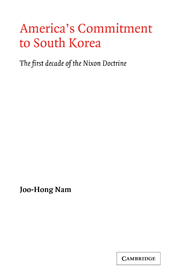Book contents
- Frontmatter
- Contents
- Preface
- Introduction
- PART ONE GENESIS
- PART TWO STRATEGY AND DOCTRINE
- 2 UNLIMITED CONTAINMENT
- 3 THE STRATEGIC IMPLICATIONS FOR KOREA OF THE NIXON DOCTRINE
- 4 THE BALANCE-OF-POWER IMPLICATIONS FOR KOREA OF THE NIXON DOCTRINE
- 5 NIXON'S LEGACY: CARTER'S POLICY OF TROOP WITHDRAWAL FROM KOREA
- 6 CONCLUSION
- Appendix I Outline of U.S. military deployment in the Western Pacific region
- Appendix II Military strength on the Korean peninsula
- Notes
- Index
4 - THE BALANCE-OF-POWER IMPLICATIONS FOR KOREA OF THE NIXON DOCTRINE
Published online by Cambridge University Press: 07 October 2011
- Frontmatter
- Contents
- Preface
- Introduction
- PART ONE GENESIS
- PART TWO STRATEGY AND DOCTRINE
- 2 UNLIMITED CONTAINMENT
- 3 THE STRATEGIC IMPLICATIONS FOR KOREA OF THE NIXON DOCTRINE
- 4 THE BALANCE-OF-POWER IMPLICATIONS FOR KOREA OF THE NIXON DOCTRINE
- 5 NIXON'S LEGACY: CARTER'S POLICY OF TROOP WITHDRAWAL FROM KOREA
- 6 CONCLUSION
- Appendix I Outline of U.S. military deployment in the Western Pacific region
- Appendix II Military strength on the Korean peninsula
- Notes
- Index
Summary
SINO-AMERIGAN DETENTE AND ITS IMPACT ON KOREA
(i) The strategy of geopolitics
The war in Vietnam conclusively demonstrated that America could neither dictate nor impose its own prescription and terms for an international order in Asia. The Vietnam experience brought about a fundamental adjustment in the existing pattern of power relations with America's erstwhile arch enemy in Asia, the People's Republic of China.
The persistence of hostile mutual deterrence between the US and China permitted neither settlement nor compromise over such intractable issues as Taiwan, Korea, and Vietnam. Yet as early as 1967, Richard Nixon had declared in his celebrated article in Foreign Affairs that ‘America cannot afford to leave China forever outside the family of nations, to nurture its own fantasies, cherish its hates and threaten its neighbors. The world cannot be safe until China changes. Thus, the US aim should be to induce that change.’ President Nixon hinted from the very day of assuming office at the need for cautious exploration of communication with the PRC through some ‘unilateral doctrinal measures’ by the United States.
In his inaugural address, Nixon defined America's new approach towards the Communist bloc at large as follows: ‘After a period of confrontation, we are entering an era of negotiation. Let all nations know that during this administration our lines of communication will be open … We cannot expect to make everyone our friend, but can try to make no one our enemy.’
- Type
- Chapter
- Information
- America's Commitment to South KoreaThe First Decade of the Nixon Doctrine, pp. 109 - 138Publisher: Cambridge University PressPrint publication year: 1986

